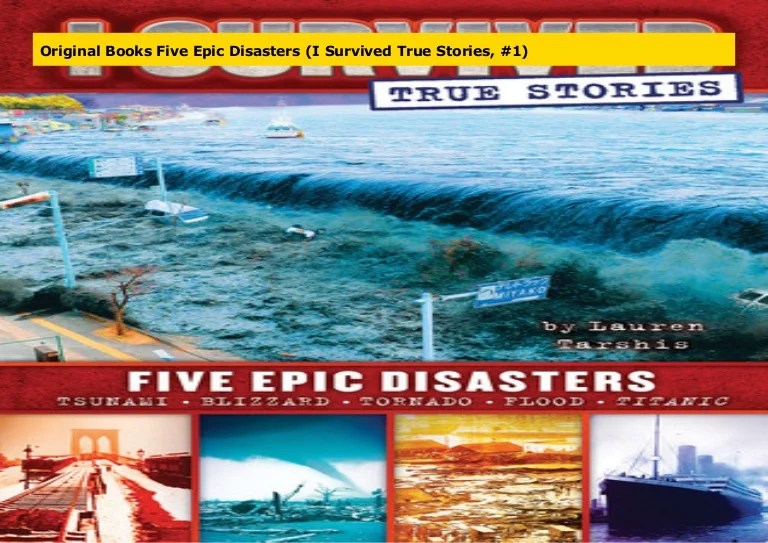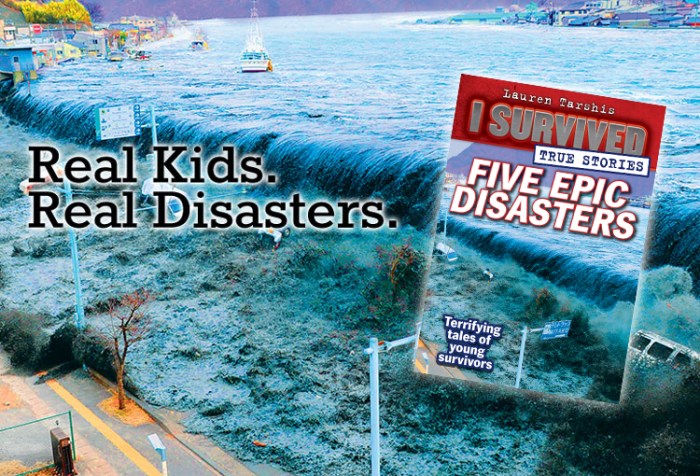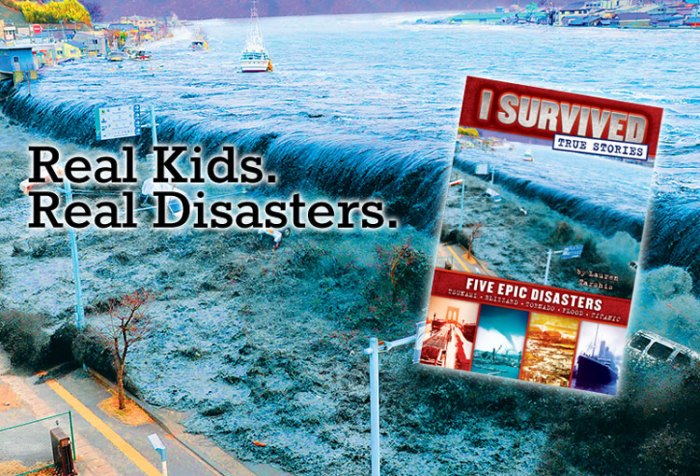I survived 5 epic disasters: a harrowing and inspiring journey that will leave you on the edge of your seat. From earthquakes to hurricanes, tsunamis to wildfires, I’ve faced the unimaginable and emerged stronger on the other side. Join me as I share my extraordinary survival stories, revealing the courage, resilience, and lessons I’ve learned along the way.
In this gripping account, I’ll take you through the terrifying moments, the life-changing decisions, and the profound impact these disasters have had on my life. Prepare to be captivated as I unravel the strategies that helped me survive and the emotional toll that such experiences can take.
Types of Disasters

Epic disasters encompass a wide range of catastrophic events that pose significant threats to life and property. These disasters can vary greatly in nature, severity, and impact, but they all share the potential to cause widespread devastation and human suffering.
The following is a comprehensive list of some of the most common and life-threatening epic disasters:
Natural Disasters
- Earthquakes:Sudden and violent shaking of the Earth’s crust, caused by the release of energy below the surface. Earthquakes can trigger landslides, tsunamis, and other secondary hazards.
- Hurricanes:Intense tropical cyclones characterized by high winds, heavy rainfall, and storm surges. Hurricanes can cause catastrophic damage to coastal areas and inland regions.
- Tornadoes:Violently rotating columns of air that extend from the base of a thunderstorm cloud to the ground. Tornadoes can cause severe destruction in a matter of seconds.
- Floods:Overflowing of water from rivers, lakes, or oceans, inundating land areas. Floods can cause widespread damage to infrastructure, property, and agriculture.
- Wildfires:Uncontrolled fires that spread rapidly through forests, grasslands, or other vegetation. Wildfires can cause extensive damage to natural ecosystems and property.
Technological Disasters
- Industrial accidents:Major incidents at industrial facilities, such as chemical spills, explosions, or fires. Industrial accidents can release toxic substances into the environment and pose significant health risks.
- Transportation accidents:Disasters involving aircraft, trains, or ships. Transportation accidents can result in mass casualties and widespread disruption of transportation networks.
- Cyberattacks:Coordinated attempts to disrupt or damage computer systems and networks. Cyberattacks can target critical infrastructure, financial institutions, and government agencies.
Other Disasters
- Pandemics:Widespread outbreaks of infectious diseases that spread rapidly across populations. Pandemics can cause significant morbidity and mortality, and disrupt healthcare systems and economies.
- War and conflict:Armed conflicts between nations or groups, resulting in widespread destruction, loss of life, and displacement of populations.
- Terrorism:Intentional acts of violence or threats thereof designed to intimidate or coerce governments or societies. Terrorism can have devastating psychological and economic impacts.
Survival Strategies
In the face of an epic disaster, survival depends on a combination of preparation, situational awareness, and quick thinking. By understanding the specific risks associated with different types of disasters, you can develop effective survival strategies that increase your chances of making it through.
Preparation
Adequate preparation is crucial for disaster survival. Gather essential supplies, such as food, water, first aid kits, and shelter, and store them in an easily accessible location. Create an emergency plan and practice it with your family or household members.
Stay informed about potential hazards in your area and know the evacuation routes.
Situational Awareness
During a disaster, situational awareness is vital. Pay attention to your surroundings and be alert to any changes or potential dangers. Listen to official announcements and follow instructions from emergency responders. If you are in a building, know the location of exits and escape routes.
If you’re looking to become an expert in civics, check out icivics a very big branch . It’s a comprehensive resource that will teach you everything you need to know about the subject. I survived 5 epic disasters and I learned a lot about civics along the way.
I’m grateful for the knowledge I’ve gained, and I’m confident that you will be too.
Quick Thinking
In the event of a disaster, time is of the essence. Quick thinking and decisive action can save lives. Trust your instincts and make decisions based on the available information. Stay calm and focused, and don’t hesitate to seek help if needed.
Physical and Emotional Impact

Surviving an epic disaster can leave a lasting impact on both the physical and emotional well-being of survivors. The immediate aftermath of a disaster can result in a range of physical injuries, including lacerations, fractures, burns, and traumatic brain injuries.
Additionally, exposure to extreme conditions, such as cold, heat, or toxic chemicals, can lead to health risks such as hypothermia, dehydration, or respiratory problems.
The emotional and psychological toll of surviving a disaster can be equally significant. Survivors may experience intense feelings of fear, anxiety, guilt, and grief. They may also struggle with post-traumatic stress disorder (PTSD), which can lead to flashbacks, nightmares, and difficulty sleeping.
The emotional impact of a disaster can linger for months or even years after the event, affecting survivors’ relationships, work, and overall quality of life.
Coping Strategies
Coping with the trauma of surviving a disaster requires a multifaceted approach. In the immediate aftermath, it is crucial to seek medical attention for physical injuries and to connect with mental health professionals for emotional support. In the long term, survivors may find it helpful to engage in therapy, join support groups, and practice self-care techniques such as exercise, meditation, and mindfulness.
Rebuilding after a disaster can be a challenging process, but it is important to remember that survivors are not alone. Community resources, government assistance, and the support of loved ones can help survivors to rebuild their lives and regain a sense of hope and normalcy.
Lessons Learned

Surviving epic disasters can impart invaluable lessons that profoundly shape perspectives and priorities. These experiences foster a deep appreciation for life, resilience, and the importance of preparedness. By sharing survival knowledge and raising awareness, individuals can empower themselves and others to navigate future disasters more effectively.
Embracing Life’s Fragility and Resilience
Epic disasters remind us of life’s unpredictable nature and the fragility of human existence. However, they also highlight the indomitable spirit of survivors, who demonstrate remarkable resilience in the face of adversity. These experiences teach us to cherish every moment, embrace our loved ones, and cultivate a deep sense of gratitude for the blessings in our lives.
Prioritizing Disaster Preparedness
Surviving a disaster firsthand instills a profound understanding of the critical importance of disaster preparedness. It emphasizes the need for comprehensive emergency plans, well-stocked emergency kits, and ongoing training and drills. By sharing their experiences and advocating for preparedness, survivors can motivate others to take proactive measures to safeguard themselves and their communities.
The Power of Community and Collaboration
Disasters often bring out the best in people, fostering a sense of community and collaboration. Survivors witness the transformative power of working together, sharing resources, and supporting one another through the recovery process. These experiences highlight the importance of building strong social networks and fostering a spirit of unity, especially during times of crisis.
Appreciating the Value of Professional Expertise
Epic disasters underscore the invaluable role of professional responders, including first responders, medical personnel, and disaster relief organizations. Survivors gain firsthand experience of the critical importance of these professionals’ expertise, dedication, and sacrifice. They develop a deep appreciation for the specialized knowledge and skills required to effectively manage disasters and mitigate their impact.
Role of Community and Support

In the face of a disaster, the community becomes a lifeline, providing essential support and resilience to survivors. When individuals band together, they can overcome challenges and emerge stronger.
Collaboration is key. By working together, communities can pool their resources, share information, and coordinate response efforts. This ensures that everyone’s needs are met, from basic necessities to emotional support.
Examples of Successful Community-Based Disaster Response Efforts
- Hurricane Katrina, New Orleans:Neighborhood groups organized to distribute food, water, and medical supplies, providing vital assistance to stranded residents.
- Nepal Earthquake, 2015:Local communities mobilized to rescue trapped victims, provide shelter, and rebuild damaged homes, demonstrating the power of collective action.
- COVID-19 Pandemic, Global:Mutual aid networks emerged, offering support through grocery delivery, childcare, and emotional counseling, fostering a sense of community amidst isolation.
Emotional support is another crucial aspect of community response. When survivors share their experiences and connect with others who understand their struggles, they can process trauma, reduce stress, and build resilience. This support network can extend beyond the immediate aftermath, providing long-term healing and recovery.
Inspiring Stories of Survival
Amidst the devastation and despair of epic disasters, tales of extraordinary survival emerge as beacons of hope and resilience. These stories, chronicling the indomitable spirit of survivors, serve as testaments to the boundless limits of human endurance.
Triumph Over Adversity
In the face of overwhelming odds, survivors have demonstrated incredible courage and determination. Their accounts paint a vivid picture of the resourcefulness and resilience that can arise even in the darkest of times. From overcoming physical injuries to navigating emotional trauma, their journeys inspire awe and admiration.
Role Models of Perseverance
These stories hold immense value as they inspire others to believe in their own abilities. By witnessing the indomitable spirit of survivors, individuals can draw strength and motivation to face their own challenges with renewed determination. The impact of these stories extends beyond the survivors themselves, creating a ripple effect that fosters a culture of resilience and hope.
Raising Awareness and Advocacy
Furthermore, these inspiring narratives play a crucial role in raising awareness about disaster preparedness and the importance of community support. By highlighting the challenges faced by survivors, they shed light on the need for better disaster response mechanisms and resources.
Through advocacy efforts, these stories can drive policy changes and inspire individuals to become more actively involved in disaster preparedness and relief initiatives.
Technological Advancements in Disaster Response: I Survived 5 Epic Disasters

The rapid advancements in technology have revolutionized disaster response, significantly improving survival rates and enhancing the efficiency of disaster management.
These advancements play a pivotal role in early warning systems, enabling timely evacuation and preparedness measures. Communication technologies facilitate seamless information exchange between responders, survivors, and the public, ensuring timely updates and coordination.
Search and Rescue Operations, I survived 5 epic disasters
- Drones equipped with thermal imaging cameras provide aerial surveillance, locating survivors trapped in debris or remote areas.
- Robotic systems navigate hazardous environments, searching for survivors and assessing structural damage.
- Advanced sensors detect vital signs beneath collapsed structures, increasing the chances of successful rescues.
Ethical Considerations
While disaster technology offers immense benefits, it also raises ethical concerns:
- Privacy concerns arise from the use of drones and surveillance technologies, which may collect sensitive personal data.
- Bias in artificial intelligence algorithms used for disaster response may lead to unequal distribution of resources or unfair treatment.
- Dependence on technology may reduce the development of traditional survival skills, potentially hindering resilience in future disasters.
Essential FAQs
What were the most challenging moments you faced during these disasters?
Each disaster presented unique challenges, but the most harrowing moments were when I feared for my life and the lives of my loved ones. The uncertainty and the feeling of helplessness were overwhelming, but I refused to give up hope.
How did you manage to stay calm and make rational decisions in such chaotic situations?
Preparation and situational awareness were crucial. By staying informed and having a plan in place, I was able to think clearly and make quick decisions. I also relied on my instincts and the support of others around me.
What are the most important lessons you learned from these experiences?
The importance of community, the power of resilience, and the fragility of life. These disasters taught me to appreciate the present moment, to be grateful for what I have, and to never take anything for granted.